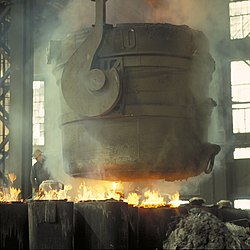Spring steel
| Steels |
|---|
 |
| Phases |
| Microstructures |
|
| Classes |
| Other iron-based materials |
|
Spring steel is a name given to a wide range of steels[1] used in the manufacture of springs, prominently in automotive and industrial suspension applications. These steels are generally low-alloy manganese, medium-carbon steel or high-carbon steel with a very high yield strength. This allows objects made of sprung steel to return to their original shape despite significant deflection or twisting.
Grades[]
Many grades of steel can be hardened and tempered to increase elasticity and resist deformation; however, some steels are inherently more elastic than others:
| SAE grade (ASTM grade) |
Composition | Yield strength | Hardness (HRC) | Comments | |
|---|---|---|---|---|---|
| Typical | Maximum | ||||
| 1070 | 0.65-0.75% C, 0.60-0.90% Mn, max .050% S, max .040% P | Normally supplied annealed | 165vpn | 180vpn | CS70, CK67, C70E |
| 1074/1075[2] | 0.70–0.80% C, 0.50–0.80% Mn, max. 0.030% P, max. 0.035% S[3] | 62–78 ksi (430–530 MPa)[4] | 44–50[5] | 50 | Scaleless blue,or Polished Bright |
| 1080 (A228) | 0.7–1.0% C, 0.2–0.6% Mn, 0.1–0.3% Si[6] | Piano wire, music wire, springs, clutch discs | |||
| 1095 (A684)[2] | 0.90–1.03% C, 0.30–0.50% Mn, max. 0.030% P, max. 0.035% S[7] | 60–75 ksi (413–517 MPa), annealed | 48–51[5] | 59 | Blue, or polished bright spring steel |
| 5160 (A689)[8] | 0.55–0.65% C, 0.75–1.00% Mn, 0.70–0.90% Cr[9] | 97 ksi (669 MPa) | 63 | Chrome-silicon spring steel; fatigue-resistant | |
| 50CrV4 (EN 10277) | 0.47–0.55% C, max. 1.10% Mn, 0.90–1.20% Cr, 0.10–0.20% V, max. 0.40% Si | 1200 MPa | Old British 735 H1steel, SAE 6150, 735A51 | ||
| 9255 | 0.50–0.60% C, 0.70–0.95% Mn, 1.80–2.20% Si[9] | ||||
| 301 spring-tempered stainless steel[10] |
0.08–0.15% C, max. 2.00% Mn, 16.00–18.00% Cr, 6.00–8.00% Ni[9] | 147 ksi (1014 MPa) | 42 | Equivalents EN 10088-2 1.4310, X10CrNi18-8 | |
Applications[]
This section needs additional citations for verification. (March 2009) |
- Applications include piano wire (also known as[11] music wire) such as ASTM A228 (0.80–0.95% carbon), spring clamps, antennas, springs, and vehicle coil springs, leaf springs, and s-tines.
- Spring steel is also commonly used in the manufacture of metal swords for stage combat due to its resistance to bending, snapping or shattering.[dubious ]
- Spring steel is one of the most popular materials used in the fabrication of lockpicks due to its pliability and resilience.
- Tubular spring steel is used in the landing gear of some small aircraft due to its ability to absorb the impact of landing.
- It is also commonly used in the making of knives.
- It is used in electrical fish tapes.
- It is used in binder clips.
- Used extensively in shims due to its resistance to deformation in low thicknesses.
See also[]
References[]
- ^ Engineering.com (23 October 2006). "Springs".
- ^ Jump up to: a b McMaster-Carr catalog (116th ed.), McMaster-Carr, p. 3630, retrieved 3 September 2010.
- ^ "74-75 Carbon Spring Steel". Precision Steel Warehouse. Retrieved 5 December 2013.
- ^ "SAE-AISI 1074 (G10740) Carbon Steel". MakeItFrom.com. Retrieved 21 August 2015.
- ^ Jump up to: a b http://www.admiralsteel.com/pdf/catalog.pdf
- ^ "ASTM A228 (SWP-A, K08500) Music Wire". MakeItFrom.com. Retrieved 21 August 2015.
- ^ "95 Carbon Spring Steel". Precision Steel Warehouse. Retrieved 5 December 2013.
- ^ McMaster-Carr catalog (116th ed.), McMaster-Carr, p. 3632, retrieved 3 September 2010.
- ^ Jump up to: a b c Oberg, Erik, and F D. Jones. Machinery's Handbook. 15th ed. New York: The Industrial Press, 1956. 1546–1551. Print.
- ^ McMaster-Carr catalog (116th ed.), McMaster-Carr, p. 3662, retrieved 3 September 2010.
- ^ Oberg et al. 2000, p. 286.
Bibliography
- Oberg, Erik; Franklin D. Jones; Holbrook L. Horton; Henry H. Ryffel (2000). Christopher J. McCauley; Riccardo Heald; Muhammed Iqbal Hussain (eds.). Machinery's Handbook (26th ed.). Ratnagiri: Industrial Press Inc. ISBN 0-8311-2635-3.
Categories:
- Steels
- Springs (mechanical)